|
|
|
Sort Order |
|
|
|
Items / Page
|
|
|
|
|
|
|
| Srl | Item |
| 1 |
ID:
184209
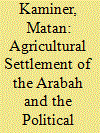

|
|
|
|
|
| Summary/Abstract |
Agricultural settlement geared to capitalist commodity production and accompanied by massive ecological interventions has historically been central to the Zionist colonial project of creating a permanent Jewish presence in the “Land of Israel.” The hyperarid southern region known as the Central Arabah is an instructive edge-case: in the 1960s, after the expulsion of the bedouin population, cooperative settlements were established here and vegetables produced through “Hebrew self-labor,” with generous assistance from the state. In the 1990s the region was again transformed as the importation of migrant workers from Thailand enabled farmers to expand cultivation of bell peppers for global markets. But today ecological destruction, depletion of water resources, and global warming cast doubt over the viability of settlement in this climatically extreme region. I locate the settlements of the Arabah within the historical political ecology of the Zionist movement, arguing that their current fragility exposes the essential precarity of capitalist colonization.
|
|
|
|
|
|
|
|
|
|
|
|
|
|
|
|
| 2 |
ID:
154303
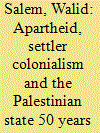

|
|
|
|
|
| Summary/Abstract |
With the Palestinians facing a belligerent occupation, an apartheid system that favors Jewish settlers and a growing settler colonial project, the Israeli-Palestinian conflict is becoming chronic, an ongoing Nakba.
|
|
|
|
|
|
|
|
|
|
|
|
|
|
|
|
| 3 |
ID:
178795
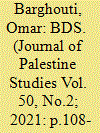

|
|
|
|
|
| Summary/Abstract |
Despite its military, diplomatic, and economic power, Israel’s regime of military occupation, settler colonialism, and apartheid still views the nonviolent, Palestinian-led global Boycott, Divestment, Sanctions (BDS) movement as a “strategic threat” to its system of injustice, waging a protracted war against the movement accordingly. This essay aims to contextualize Israel’s war on BDS by examining the movement’s origins, principles, impact, and theory of change. It analyzes the most critical challenges BDS is facing and its most promising strengths, especially its balancing of ethical principles with strategic effectiveness and its intersectional approach to the struggle for Palestinian freedom, justice, and equality.
|
|
|
|
|
|
|
|
|
|
|
|
|
|
|
|
| 4 |
ID:
174253
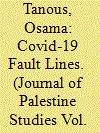

|
|
|
|
|
| Summary/Abstract |
This essay explores representations of Palestinian physicians in the Israeli health-care system during the Covid-19 pandemic and the dynamics that have played out in that system during the public health emergency from the perspective of a Palestinian physician. It argues that the health-care system, an essential pillar and infrastructural foundation of the settler-colonial project, is naively imagined as an apolitical, neutral sphere. As the site of a metaphorical battlefield against Covid-19, it has been window-dressed as an arena for brotherhood between Israeli Palestinians and Jews, and fantasized about as a gateway to political gain or equality for the Palestinian citizens of Israel (PCIs). Throughout the process, settler militarism, settler symbols, and settler domination have continued to be normalized.
|
|
|
|
|
|
|
|
|
|
|
|
|
|
|
|
| 5 |
ID:
188227
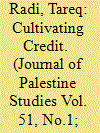

|
|
|
|
|
| Summary/Abstract |
Since 2007, the Palestinian Authority has implemented a strategy of financialized urbanization in response to economic crises precipitated by Israel’s settler-colonial stranglehold on the Palestinian economy. This article argues that financialized urbanization operates as a mechanism to expand the local banking sector and as a modality of settler-colonial alienation. Examining the joint-ownership structures of companies whose activities straddle real estate and financial markets, the article shows where land ownership in the West Bank ultimately lies. The study highlights qualitative changes in money lending and the extended reach of finance to emphasize the risks of financial collapse. Understanding finance capital and settler colonialism as systems predicated on managing risk for maximum returns, the discussion draws their relation to each other into a single analytical framework to center the question of land dispossession and racialization at the heart of financialized urbanization.
|
|
|
|
|
|
|
|
|
|
|
|
|
|
|
|
| 6 |
ID:
184298
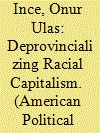

|
|
|
|
|
| Summary/Abstract |
Recent literature on racial capitalism has overwhelmingly focused on the Atlantic settler-slave formation, sidelining the history of European imperialism in Asia. This article addresses this blind spot by recovering the aborted project of British settler colonialism in India through the writings of its most prominent advocate, John Crawfurd. It is argued that Crawfurd’s vision of a liberal empire in India rejected slavery and indigenous dispossession yet remained deeply racialized in its conception of capital, labor, and value. Crawfurd elaborated a “capital theory of race,” which derived racial categories from a civilizational spectrum keyed to the capitalist organization of production. His proposals accordingly revamped the conventional terms of colonization by representing India as overstocked with labor but vacant of capital and skill that only European settlers could provide. The article concludes with the broader implications of a transimperial analytic framework for writing connected histories of racial capitalism and settler colonialism.
|
|
|
|
|
|
|
|
|
|
|
|
|
|
|
|
| 7 |
ID:
178792
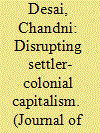

|
|
|
|
|
| Summary/Abstract |
This article explores the resurgence of Indigenous/Palestine solidarity during the Wet’suwet’en land sovereignty struggle in Canada that took place around the same time Donald Trump’s Middle East “peace plan” was released in early 2020. Historicizing this resurgence within a longer period of anti-colonial resistance, the article attends to the distinct historical, political-economic, and juridical formations that undergird settler colonialism in Canada and Israel/Palestine. It contends with the theoretical limits of the settler-colonial framework, pushing back against narratives of settler success, and shows how anti-colonial resistance accelerated economic crises that led both settler states to enter into “negotiations” with the colonized (reconciliation in one case, and peace talks in the other) as a strategy to maintain capitalist settler control over stolen lands. The analysis also sheds light on a praxis of solidarity that has implications for movement building and joint struggle.
|
|
|
|
|
|
|
|
|
|
|
|
|
|
|
|
| 8 |
ID:
191919
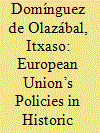

|
|
|
|
|
| Summary/Abstract |
Most analyses of European Union (EU) policies relating to the Israeli-Palestinian conflict do not question the epistemological framework on which these policies are based. The 1967 paradigm preferred by the EU does not address the inalienable rights of all Palestinians but rather focuses exclusively on a particular group, those Palestinians living in the Gaza Strip and the West Bank, territories that have been under Israeli occupation since 1967. This focus ignores (or at most leaves in a second place) the rest of the Palestinian people: both 1948 Palestinians and the Palestinian diaspora, whose rights are part and parcel of the question of Palestine. This article examines how the EU bases its policies on different kinds of securitisation concerning distinct Palestinian communities. It does so through a two-step securitisation process that frequently rubber-stamps Israel’s narrative of securitisation. This compartmentalising program ultimately is complicit with Israel’s ‘divide and rule’ strategy and settler-colonial mechanisms, contributing to the deepening of Palestinian fragmentation. Moreover, it renounces exploring alternative proposals and paradigms that consider the rights of the Palestinian people as a whole and envisages decolonisation as the desired outcome.
|
|
|
|
|
|
|
|
|
|
|
|
|
|
|
|
| 9 |
ID:
142837
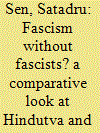

|
|
|
|
|
| Summary/Abstract |
This essay examines some aspects of Hindutva and Zionism, taking a comparative approach that underlines the ubiquity—i.e. the comparability—of fascisms in the articulation of modernity. It focuses on the imaginary of race, place and peoplehood in each ideology, the roles of majorities and minorities in the formulation of national well-being, and possible exit strategies from violently exclusivist statecraft. It explores, also, an intellectual prehistory in which Indian nationalists cultivated a fascination with Jews and Zionism as part of their understanding of a race constituted by historical damage and the imperative of repair. It argues, first, that the comparative study of fascisms is not only valid, but necessary to the politics of democracy. Second, it argues that because Indian fascism is less racialised than the Israeli version, it is more open to contestation and mitigation by the deployment of alternative imaginaries of ethnicity and nationhood.
|
|
|
|
|
|
|
|
|
|
|
|
|
|
|
|
| 10 |
ID:
148025


|
|
|
|
|
| Summary/Abstract |
Film production has for a long time been a prominent medium for Palestinians to resist Israeli occupation and create a cultural memory. Though there are some academic studies on the subject, a critical framework of analysis for such films remains underdeveloped. This article argues that Palestinian film production has surged particularly in recent years as part of an increasingly globalised dimension to Palestinian resistance, alongside such initiatives as the Electronic Intifada and the BDS movement. Early Zionist rhetoric asserted the non-existence (or invisibility) of Palestinians. Several decades later, when the Arab revolt was shut down, the Israeli official propaganda largely shifted to a discourse of “emergency”, which decontextualizes the anti-colonial nature of Palestinian resistance. The films 5 Broken Cameras (2011) and Private (2004) both engage with Israeli colonialism and the state of emergency by acting as tools of witnessing, laying bare the occupational strategies the Israelis use under emergency law and revealing the arbitrary nature of such practices as the Separation Wall. The films challenge Israeli authority through their depictions of predominantly non-violent forms of resistance, which counters their historically constructed invisibility as a people, as well as the colonialist narrative of “terrorism”. Non-violent resistance makes the recognition of Israeli authority problematic, as the settlers cannot use brute force to drive out the Palestinians if there is no documented incident in context to justify violence. Furthermore, the article argues that the form of the films – pseudo-documentary and especially “talking witness” documentary – enables their emotive content to reach out to an international audience, which could potentially respond. Thus, the films not only contain acts of resistance, but they significantly are tools of resistance in the conflict.
|
|
|
|
|
|
|
|
|
|
|
|
|
|
|
|
| 11 |
ID:
167959
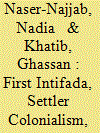

|
|
|
|
|
| Summary/Abstract |
This article engages with the views of prominent leaders from the First Intifada to evaluate the possibility of a Palestinian uprising under existing circumstances. It provides insight into the past and present to establish a basis for contemporary struggle. In acknowledging the fragmentation of Palestinian land and population, the article argues that many of the features that made popular struggle possible during the First Intifada are now clearly absent, requiring a new praxis of resistance.
|
|
|
|
|
|
|
|
|
|
|
|
|
|
|
|
| 12 |
ID:
158369
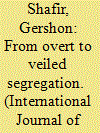

|
|
|
|
|
| Summary/Abstract |
This article's geographical focus is the Galilee, Israel's only region with a Palestinian Arab majority. Its sociological focus is the drive to Judaize this region, the mirror image of its de-Arabization, which I anchor in Israelis’ morbid fear of settler colonial reversal. Although direct legal discrimination—restriction of movement under a military government and exclusion from publicly administered land—was banned by the government and the High Court of Justice respectively, new modes of discrimination against Israel's Arab citizens have replaced the older forms. I demonstrate how policies that limit Arab middle-class citizens’ upwardly mobile migration into the Judaized spaces of communal settlements (or overlooks) and towns endure. I compare gatekeeping exercised by national-level indirect legal discrimination operating through the admission committees of communal settlements with the institutional discrimination practiced by municipalities of emerging mixed towns against new Arab residents’ public presence. Finally, I highlight the linkages between instances of Judaization across the Green Line, which make the unwinding of segregation, in all of its forms, that much harder.
|
|
|
|
|
|
|
|
|
|
|
|
|
|
|
|
| 13 |
ID:
171674
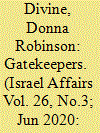

|
|
|
|
|
| Summary/Abstract |
The Gatekeepers” describes the reaction of a handful of well established Israel Studies scholars to a special issue of the journal Israel Studies called “Word Crimes: Reclaining the Language of the Israeli-Palestinian Conflict”. These professors preferred to denounce rather than engage with the arguments and analyses presented in the special issue deploying their authority to try to silence this challenge to the conventional discourse on the Middle East Conflict.
|
|
|
|
|
|
|
|
|
|
|
|
|
|
|
|
| 14 |
ID:
178333
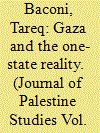

|
|
|
|
|
| Summary/Abstract |
In contemporary conversations around Israel/Palestine, the Gaza Strip is construed as a state of exception, rendering the territory either hypervisible or entirely invisible. Through the prism of the Covid-19 pandemic and Israel’s possible de jure annexation of portions of the West Bank, this piece argues that rather than being exceptional, the Gaza Strip represents the very embodiment of Israeli settler colonialism in Palestine. Its isolation and de-development constitute the endpoint of Israel’s policies of land theft and Palestinian dispossession. This endpoint, referred to as Gazafication, entails the confinement of Palestinians to urban enclaves entirely surrounded by Israel or Israeli-controlled territory. The Trump plan, otherwise known as the “deal of the century,” along with the Covid-19 crisis, have inadvertently exposed the reality of Gaza as an enclave of the one-state paradigm.
|
|
|
|
|
|
|
|
|
|
|
|
|
|
|
|
| 15 |
ID:
147387
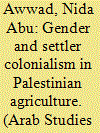

|
|
|
|
|
| Summary/Abstract |
The gendered nature of the agricultural sector is significantly influenced by the political and socio-economic and cultural structure of any society. The division of labor between males and females within the family farm is seriously affected as a response to economic pressures along with the impact of other restrictions imposed by predetermined gender roles. In the Palestinian context, economic pressures were created mainly by the structural transformation in Palestinian agriculture following the Zionist settler colonization of Palestine, along with other minor factors related to the Palestinian neoliberal economic policies dictated by the international financial institution and Zionist interests. This article argues that the gendered nature of the Palestinian agriculture sector has been transformed and has promoted women's exploitation as follows: First, restructure of the agricultural employment by the decline of both women's and men's employment of the total Palestinian labor force within serious exploitive and fluctuating conditions; second, changes in tasks and division of labor, women's property rights for agricultural land resources and services provided by the Palestinian Authority; and finally increasing women's burden by increasing their time allocation for agricultural tasks. The data presented in the article are based on a comprehensive analysis of secondary information on Palestinian agriculture, and primary data collected in 2010 with the help of a few households case studies (life history) from two locations in the central region of the West Bank.
|
|
|
|
|
|
|
|
|
|
|
|
|
|
|
|
| 16 |
ID:
169029
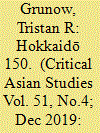

|
|
|
|
|
| Summary/Abstract |
This roundtable presents the proceedings of the “Hokkaidō 150: Settler Colonialism and Indigeneity in Modern Japan and Beyond” workshop held at the University of British Columbia in March 2019. The sesquicentennial of Japanese settler colonization of the northern island of Hokkaidō or Ainu Mosir received only scant attention either in Japan or around the world. The goal of this roundtable is to reinsert settler colonialism into modern Japanese history while introducing the case of the Ainu into global conversations of Indigeneity. Katsuya Hirano draws attention to how the Meiji state manipulated ideas of ownership to enable exploitation of Ainu lands. ann-elise lewallen recenters Ainu women’s resistance to the sexual colonization of Hokkaidō. Mai Ishihara interrogates her own positionality and asks why many people with Ainu heritage remain silent. Sheryl Lightfoot reviews how the case of the Ainu in Hokkaidō complicates prevailing paradigms of settler colonial studies. Musicians Mayunkiki, Tomoe Yahata, and Terri-Lynn Williams-Davidson discuss issues of Indigenous identity and their practice. Finally, Danika Medak-Saltzman concludes the roundtable by re-situating Ainu at the intersection of settler colonial and Native studies, challenging Japan scholars to more meaningfully engage and prioritize Indigenous studies.
|
|
|
|
|
|
|
|
|
|
|
|
|
|
|
|
| 17 |
ID:
120789


|
|
|
|
|
| Publication |
2013.
|
| Summary/Abstract |
In many ways, the structural violence of settler colonialism continues to dominate the lived experience of Indigenous populations, including Aboriginal and Torres Strait Islander peoples in contemporary Australia. One aspect of this structural violence concerns the regulation of Indigenous identity, today perpetuated through state monitoring of the 'authenticity' of Aboriginal people. This article argues that the contest over Indigenous identity perpetuates a form of symbolic political violence against Indigenous people. It considers the ways in which structural violence against Indigenous identity has featured in Australia's settler colonial regime and examines the particular violence faced by urban-dwelling Aboriginal people, who endure much contemporary scrutiny of the 'authenticity' of their Indigeneity. As a case study, the article examines the symbolic violence associated with a particular legal case in Australia and, in light of this analysis, concludes that settler colonies could make a decolonising gesture by legislating for the protection of Indigenous identity.
|
|
|
|
|
|
|
|
|
|
|
|
|
|
|
|
| 18 |
ID:
155163
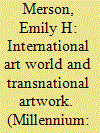

|
|
|
|
|
| Summary/Abstract |
Drawing from and contributing to the International Relations (IR) aesthetics literature, I analyse how Anishinaabe artist Rebecca Belmore’s 2005 Venice Biennale performance-based video installation Fountain is an enactment of creative presence at an intersection of international and transnational politics. Belmore’s aesthetic method of engaging with water as a visual interface between the artist and viewer, by projecting the film of her performance onto a stream of falling water in the Canadian Pavilion exhibition, offers a method of understanding and transforming settler colonial power relations in world politics. I argue that Belmore’s artistic labour and knowledge production is an expression of Indigenous self-determination by discussing how Fountain is situated in relation with Indigenous peoples’ transnational land and waterway reclamations and cultural resurgences as well as the colonial context of the international art world dynamics of the Venice Biennale. My analysis of Belmore’s decolonial sensibility and political imagination with respect to water contributes to IR aesthetics debates by foregrounding the embodiment of knowledge production and performance artwork as a method of decolonisation.
|
|
|
|
|
|
|
|
|
|
|
|
|
|
|
|
| 19 |
ID:
159852
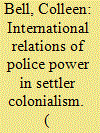

|
|
|
|
|
| Summary/Abstract |
In contrast to narratives by the Royal Canadian Mounted Police, the United Nations, and some scholars that international police assistance is a relatively recent phenomenon, we argue that Canada's Mounties have always been international. To develop this argument, we examine three dimensions of police power in international relations historically and with respect to the role of the Mounties specifically. First, we discuss the concept of police power and its central role in giving rise to another concept: civilization. The concept of civilization gained considerable traction as a rationale for police power in Britain's colonies, including Canada. Second, we turn to a discussion of imperial policing in the colonial settlement of Canada involving an elaborate array of “civilizing” techniques, some of which are still in operation today. Since Confederation, the Mounties have been involved in wide-ranging state-building missions with the purpose of securing Canadian sovereignty, in part through land and resource acquisition, and the denial of Indigenous sovereignties. Third, we show that the Mounties' contributions to settler colonialism played a role in shaping international relations from the twentieth century. In particular, the Mounties were central in constituting Canada as a member of the globally dominant Anglo-Saxon community of states. In conclusion, we suggest that current international policing practices in the global periphery are not novel phenomena, but are rooted in international police powers that made possible the colonial settlement of Canada.
|
|
|
|
|
|
|
|
|
|
|
|
|
|
|
|
| 20 |
ID:
190015
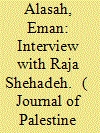

|
|
|
|
|
| Summary/Abstract |
This interview is part of an ongoing PhD research project on contemporary Anglophone Palestinian memoirs, autobiographies, and life narratives. The project examines the linguistic, aesthetic, and thematic elements of a number of texts that document daily life under occupation in Palestine within a settler-colonial theoretical framework. Interviews with authors have been conducted to foreground the textual analysis of the texts. Due to COVID-19 restrictions, this interview was conducted online via Zoom in February 2022, and was later edited by the interviewer and the interviewee.
|
|
|
|
|
|
|
|
|
|
|
|
|
|
|
|
|
|
|
|
|